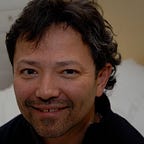Desire 1
Desire as abundance not lack.
Immanent Ethics
The central proposition of an immanent ethics is that a body or mode of existence be evaluated in terms of the deployment of its powers of acting (via accessing active forces) such that it goes to the limit of what it can do. And that it not be judged in relation to transcendent principles or values.
The central question then, for Gilles Deleuze, is how is it that the power of acting of a mode of existence is increased, and how is it that a mode of existence becomes separated from its power of acting.
This, in turn, focuses the enquiry on what exactly is the source of our power of acting: how might we enhance at the source our propensity to access the active forces of life, to affect and be affected; and how might we become separated from this source?
Nietzsche’s Drives
Deleuze interprets Nietzsche’s will to power as a relational concept consisting in a multiplicity of affective forces.
Nietzsche refers to those forces as “drives” that compete and conflict and result in us at any point in time having only a limited perspective on matters:
Every drive is a kind of lust to rule, each one has its perspective that it would like to complete all the other drives to accept as a norm. (The Will to Power)
For Nietzsche, perspectivism is based in the drives: there are no facts, only interpretations; and these perspectives are the result of competing unconscious drives, not conscious decisions or perceptions.
Nietzsche asserts there is no struggle between reason and desire. Reason is nothing more than a certain ordering of the drives. Thinking, willing, feeling are all:
…merely a relation of these drives to each other. (Beyond Good and Evil)
Morality is nothing more that an ordering of human impulses. Morality, as distinct from ethics, is promulgated not by those who would act, but by those who would judge.
Judgmental morality is based in the reactive forces of guilt and ressentiment, which have their source in unconscious drives.
Such reactive drives result from the notion of a transcendent subject that judges actions, turning inward on itself, creating within itself bad conscience.
Desire as Unconscious Drives
Similar to Nietzsche, Deleuze locates the source of the power to act in terms of “desire” as unconscious drives, and not conscious decisions or interests.
For Deleuze, desire is a set of unconscious drives and inclinations ordered into capacities that define a mode of existence. Desire converges with Deleuze’s use of the term “force”: the affective nature of active forces, enhancing the ability to affect and be affected, translates in to unconscious desire.
The will to power and desire are aligned:
A body’s ability to increase active forces, its ability to affect and be affected, to take its power to the limit, increases as its sensitivity to intensity increases; as its ability to tap into innate desire increases.
Desire as Productive
Desire is always positive and productive. Desire is the process that produces intensities that enable us to act. Desire is the source of our power and capacity to act.
Desire is more not less.
It produces real connections, investments and intensive states within and between bodies. Desire overflows within and without.
Desire produces reality. (Anti-Oepidus)
Desire is not defined in terms of lack. It is not wanting something we do not or cannot have. It is what we desire that can lead to lack. It is only when we invest our desire in social formations based in transcendence that desire produces lack.
When we invest our desire in the immanent, in our capacities and powers, we experience abundance, the freedom of abundance.
Desire ordered in accordance with our capacities and powers is the engagement of unconscious intensities connecting to form virtual multiplicities, which in turn make anything possible.
Desire is productive: it creates the new.
I hope you enjoyed this article. Thanks for reading!
Tomas
Please join my email list here or email me at tomas@tomasbyrne.com.
Excerpt from my forthcoming book, Becoming: A Life of Pure Difference (Gilles Deleuze and the Philosophy of the New) Copyright © 2021 by Tomas Byrne. Learn more here.
